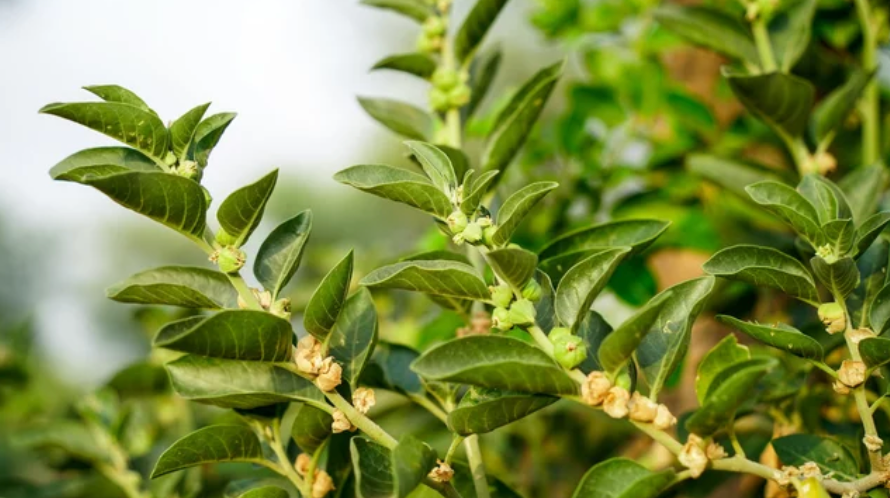Nestled within the holistic tapestry of Ayurvedic medicine lies Ashwagandha, one of natures most powerful adaptogens dating back over 3,000 years.
Originating in India, particularly the drier regions of India, Pakistan, Sri Lanka, and Nepal, it thrives in arid climates, including the foothills of the Himalayas.
Ashwagandha, a small shrub with yellow flowers is regarded as one of the most important herbs in Ayurveda, the ancient holistic healing system that seeks to balance the body, mind, and spirit.

The name “Ashwagandha” is derived from Sanskrit, with “ashwa” meaning horse and “gandha” meaning smell, reflecting the herb’s horse-like odor and its traditional belief of conferring the strength and vitality of a horse to those who consume it. Ashwagandha is also referred to as “Indian ginseng” or “winter cherry” sometimes, due to its red berries and cherry-like appearance.
What is Ayurvedic Medicine?
Ayurveda as its commonly known is considered one of the oldest medical systems in the world and continues to be practiced extensively in India and other parts of the world.
The word “Ayurveda” itself is derived from Sanskrit, with “Ayur” meaning life and “Veda” meaning knowledge or science. Therefore, Ayurveda is often translated as the “science of life” or the “knowledge of longevity.”

Ayurveda views the universe, including the human body, as composed of five fundamental elements:
- Earth
- Water
- Fire
- Air
- Ether
The Doshas
Doshas are fundamental energies or principles that govern the functioning of the human body and mind. There are three primary doshas, with each person believed to have a unique dosha at birth.
- Vata / Air & Ether. Those with the vata dosha are usually described as slim, energetic, and creative. They’re known for thinking outside the box but can become easily distracted. Due to their “on-the-go” nature, those with vata-dominant doshas should focus on activities that involve constant movement, such as cycling, running, walking, yoga, tai chi, etc.
- Kapha. People with this dosha are described as strong, thick-boned, and caring. Kapha doshas work best with a workout buddy and should focus on a combination of cardio and weight-resistance exercise to stay interested and motivated. Any type of movement is beneficial for this group.
- Pitta. People with pitta are said to usually have a muscular build, be very athletic, and serve as strong leaders. Pitta doshas tend to push themselves too hard and should avoid exercising in the heat. Team sports are an excellent way to stay active while satisfying pitta’s natural competitiveness.
At its core, Ayurveda is based on the simple belief that optimal health is achieved through a balance of body, mind, and spirit.
Ashwagandha in Ayurveda
Classified as an adaptogen, Ashwagandha is in a unique category of herbs that help the body adapt to stress and maintain balance.
Whereas in Ayurvedic texts such as the Charaka Samhita and Sushruta Samhita, Ashwagandha is classified as a Rasayana, or rejuvenating herb; prized for its ability to enhance vitality, promote longevity, and restore balance to the body, mind and spirit.
It is considered particularly beneficial for building Ojas, the essential energy of vitality and immunity in Ayurveda.

The Benefits:
It is often prescribed in various forms, including powders, capsules, teas, and medicated oils. Ashwagandha’s therapeutic use in Ayurvedic medicine spans a wide range of health concerns, including:
- Rejuvenation and Longevity: It has been historically prescribed to enhance vitality, promote longevity, and restore youthfulness by nourishing the body’s tissues (dhatus) and supporting overall well-being.
- Stress Relief: Ashwagandha is prized for its adaptogenic properties, which help the body adapt to stressors and maintain balance during challenging situations. It has traditionally been used to reduce stress, anxiety, and nervousness, promoting a sense of calmness and relaxation.
- Immune Support: Ashwagandha is revered for its immune-modulating effects, which help strengthen the body’s natural defenses and promote resilience against infections and diseases.
- Energy and Vitality: Ashwagandha has long been valued for its ability to boost energy levels, increase stamina, and improve overall vitality. It is often prescribed to individuals experiencing fatigue, weakness, or low energy, helping them regain strength and vigor.
- Reproductive Health: Ashwagandha is considered beneficial for both male and female reproductive health. In men, it is traditionally used to support virility, enhance sperm quality, and improve fertility. In women, it may help regulate menstrual cycles, alleviate menstrual discomfort, and support hormonal balance.
- Cognitive Function: Ayurvedic practitioners have historically prescribed Ashwagandha to enhance cognitive function, improve memory, concentration, and mental clarity. It is believed to nourish the brain and nervous system, promoting overall cognitive health.
- Joint Health: Ashwagandha’s anti-inflammatory properties were traditionally used to alleviate pain, inflammation, and stiffness associated with conditions like arthritis and rheumatism.
- Digestive Support: Ashwagandha helps soothe gastrointestinal discomfort and support healthy digestion. It may be used to alleviate symptoms such as indigestion, bloating, and gas.
What does science say?
Ashwagandha emerges as a captivating subject of scientific inquiry, bridging the gap between traditional wisdom and contemporary healthcare practices.

Scientific research suggests that Ashwagandha may: (with links)
- Reduce stress and anxiety.
- Support cognitive function.
- Modulate the immune system.
- Exhibit anti-inflammatory effects.
- Provide antioxidant protection.
- Help regulate hormone levels.
- Improve physical performance.
- Enhance sleep quality.
Our Ashwagandha Adaptogenic Blend:
When it comes to ashwagandha supplements, quality matters, and KSM66 stands out as the gold standard in the industry. What sets KSM66 apart is its unique extraction process, which focuses solely on the ashwagandha root, excluding the leaves. Furthermore, this meticulous extraction method yields a full-spectrum extract with unparalleled quality and superior bioavailability.
Our Ashwagandha blend also includes rejuvenating roots like Ginger and Turmeric, Maca root, Ginseng, as well as nourishing herbs and mushrooms such as Holy Basil, Reishi and Cordyceps.

#fuelyourlife

